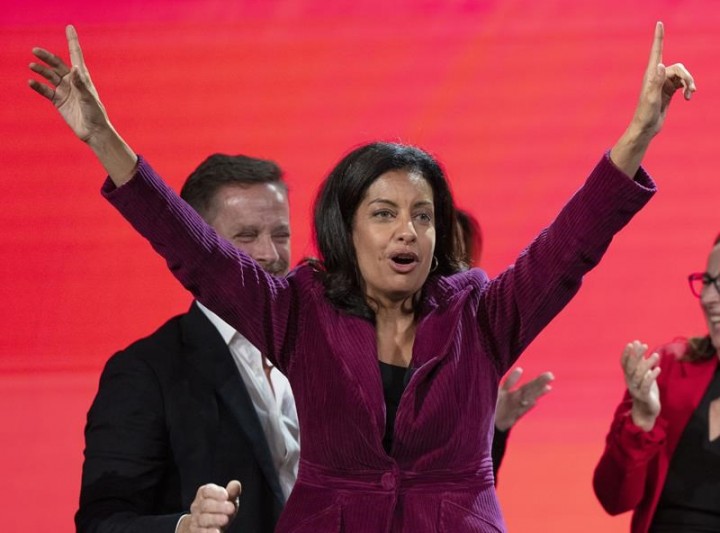MONTREAL — Quebec Liberal Party Leader Dominique Anglade was re-elected in her riding Monday night, and her party retained official Opposition status in the legislature.
But the Quebec provincial election saw no comeback for the Liberals, whose percentage of the popular vote fell to less than two-thirds of what it was in 2018.
In a concession speech, Anglade — the first woman of colour to lead the party — made a point of saying that her Liberals would endeavour to represent citizens of all ethnic backgrounds. She said in English: “We will represent all Quebecers of all stripes.”
She added that it was “clear” from the vote results that Quebecers were asking the Liberals to form a strong Opposition. But just before 11 p.m. on Monday evening, the Liberals were sitting in fourth place in the popular vote, at just about 14 per cent, trailing both Québec solidaire and the Parti Québécois.
The Liberal seat count will be disproportionately stronger than that of both of those parties, however, largely because Anglade’s party dominated in its traditional strongholds in Montreal, home to the province’s most culturally diverse ridings.
The PQ and Quebec’s revived Conservative Party, which was on track to win about 13 per cent of the vote but unlikely to win any seats, were strongest across ridings ultimately won by the CAQ.
Conservative Leader Éric Duhaime said in his own speech, “As I speak to you, we have exactly the same number of votes as the Quebec Liberal Party, but there are 20 elected members missing when you compare one party with the other.”
He called it the “democratic distortion of the century.”
Québec solidaire spokesman Gabriel Nadeau-Dubois, meanwhile, said the results reflect a “broken” electoral system. At 11:15 p.m., with 15 per cent of the vote, Québec solidaire had 10 seats.
“Our democracy is sick and the electoral map tonight does not reflect the political will of Quebecers,” he said.
Despite the efficiency of their vote, the Liberals had a bad night. Although the party retained official Opposition status, it lost seats to a vastly expanded Coalition Avenir Québec majority. The Liberals had won 31 seats with just under 25 per cent of the vote in 2018.
Anglade, 48, has held the Montreal St-Henri-Ste-Anne riding since 2015, and the Liberals have never lost the seat since its creation in the 1990s. But a close race had been expected in her riding, and just after 11 p.m., she was on track to win with a lead of less than 10 percentage points. The QS candidate was the runner-up.
An engineer and a daughter of Haitian academics who immigrated to Montreal, Anglade became leader of the party in May 2020. Though she steered Liberals to a disappointing result Monday, she had said ahead of the vote that she planned to continue on as leader regardless of the outcome. Her speech offered no hint at a resignation.
About a hundred supporters gathered Monday night at the Corona Theatre in Anglade’s riding, chatting, drinking and looking to be in reasonably good spirits despite the media calling a decisive victory for the CAQ about 10 minutes after polls closed.
For Juliana Galindo, 27, it was a good night. A Liberal was elected in the Montreal riding where she lives. But the overall result was disappointing, she said. The CAQ’s values don’t align with hers, and Premier François Legault’s recent comments on immigration were “disappointing,” she said.
During the campaign, Legault had tied immigration with “violence” and “extremism,” and he suggested it would be “suicidal” for Quebec to accept more than 50,000 newcomers per year.
Christopher Baenninger was the Liberal candidate who challenged QS heavyweight Manon Massé in the Montreal riding of Ste-Marie-St-Jacques. “We’re outperforming, even if I’m silver medal,” he said, explaining that the Liberals were projected to come in fourth in his riding. Instead, he came in a strong second — though Massé won handily.
Baenninger said the CAQ has “taken all the oxygen out of the air,” adding that the emergence of more parties has divided the Liberal vote. But he said he’s hopeful that Liberals will be a strong voice of opposition against what he called Legault’s desire to “punish” immigrants rather than bringing them into the fold.
This report by The Canadian Press was first published Oct. 3, 2022.
Marie-Danielle Smith, The Canadian Press
Related
































